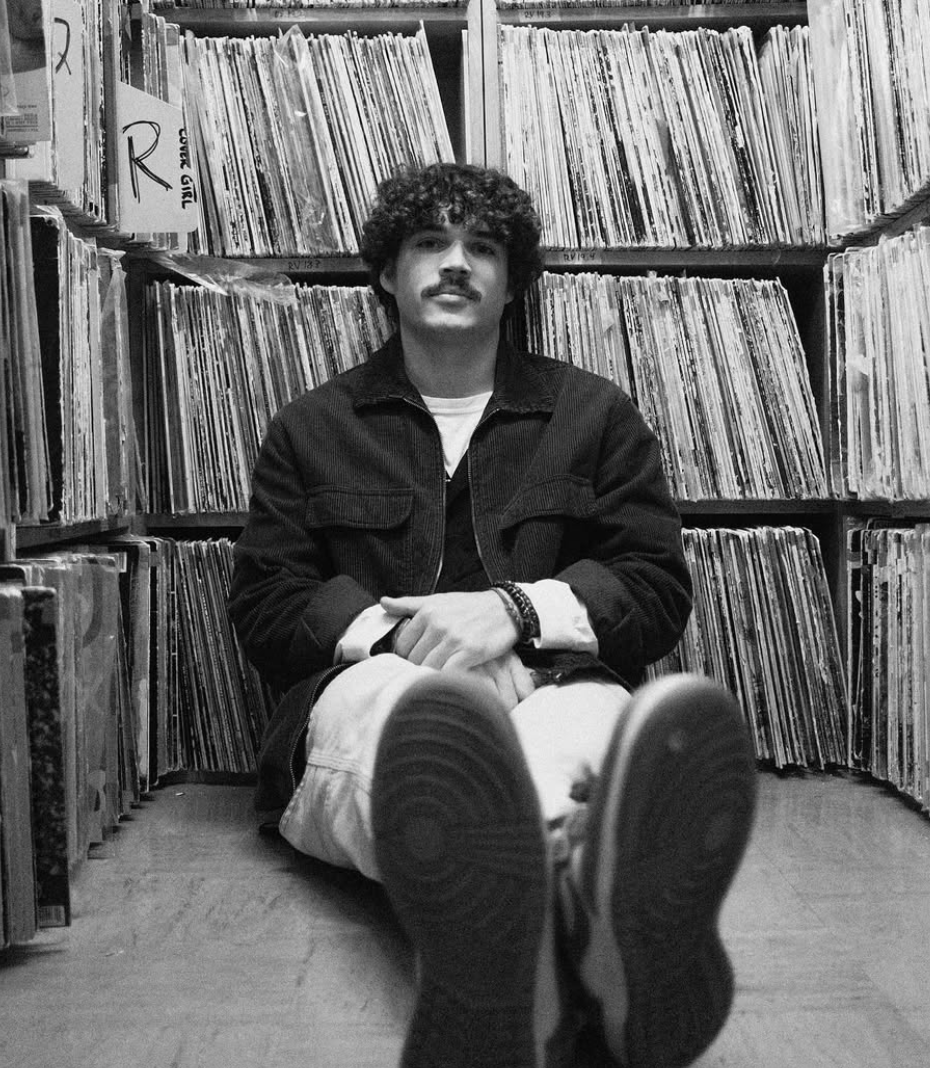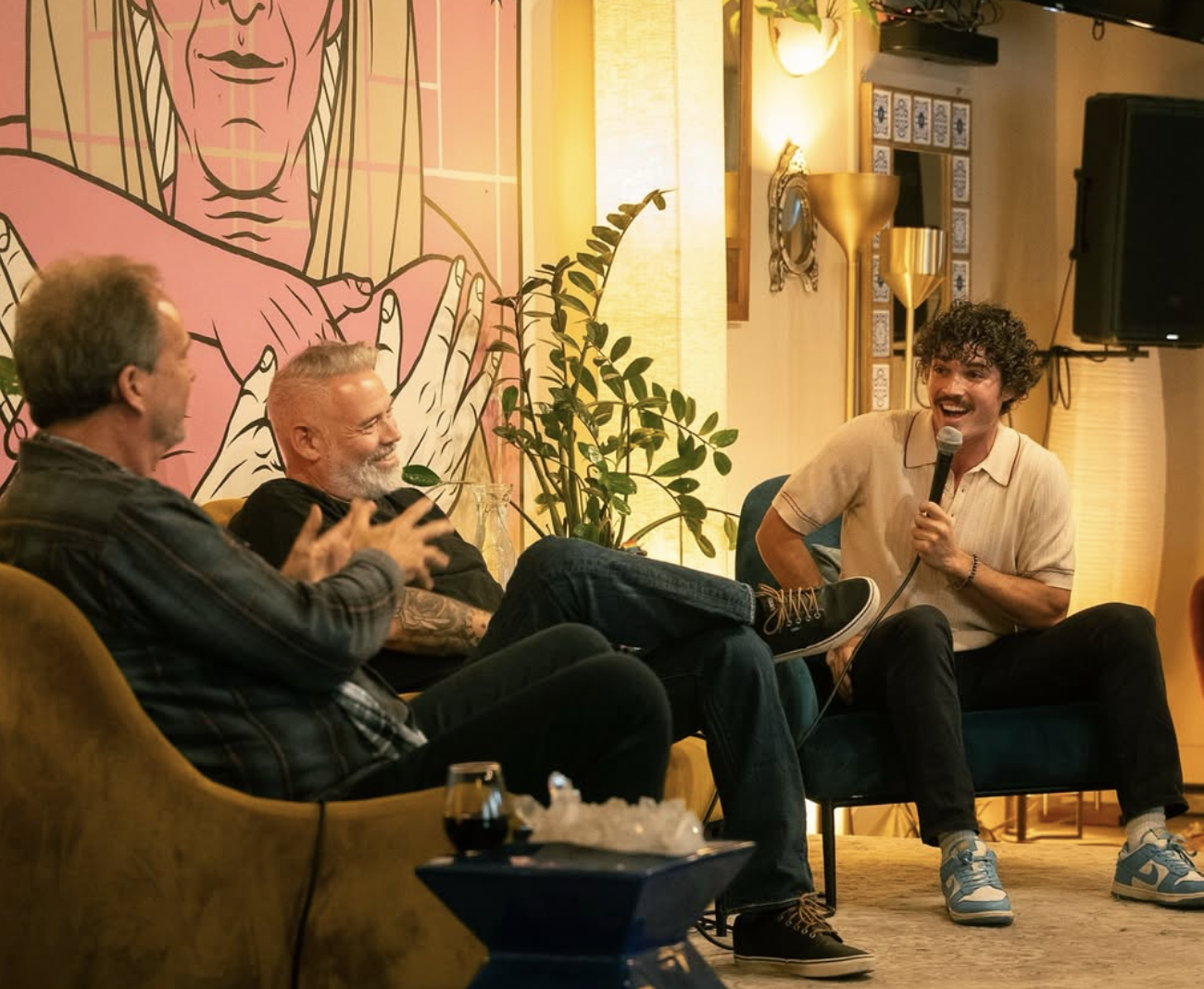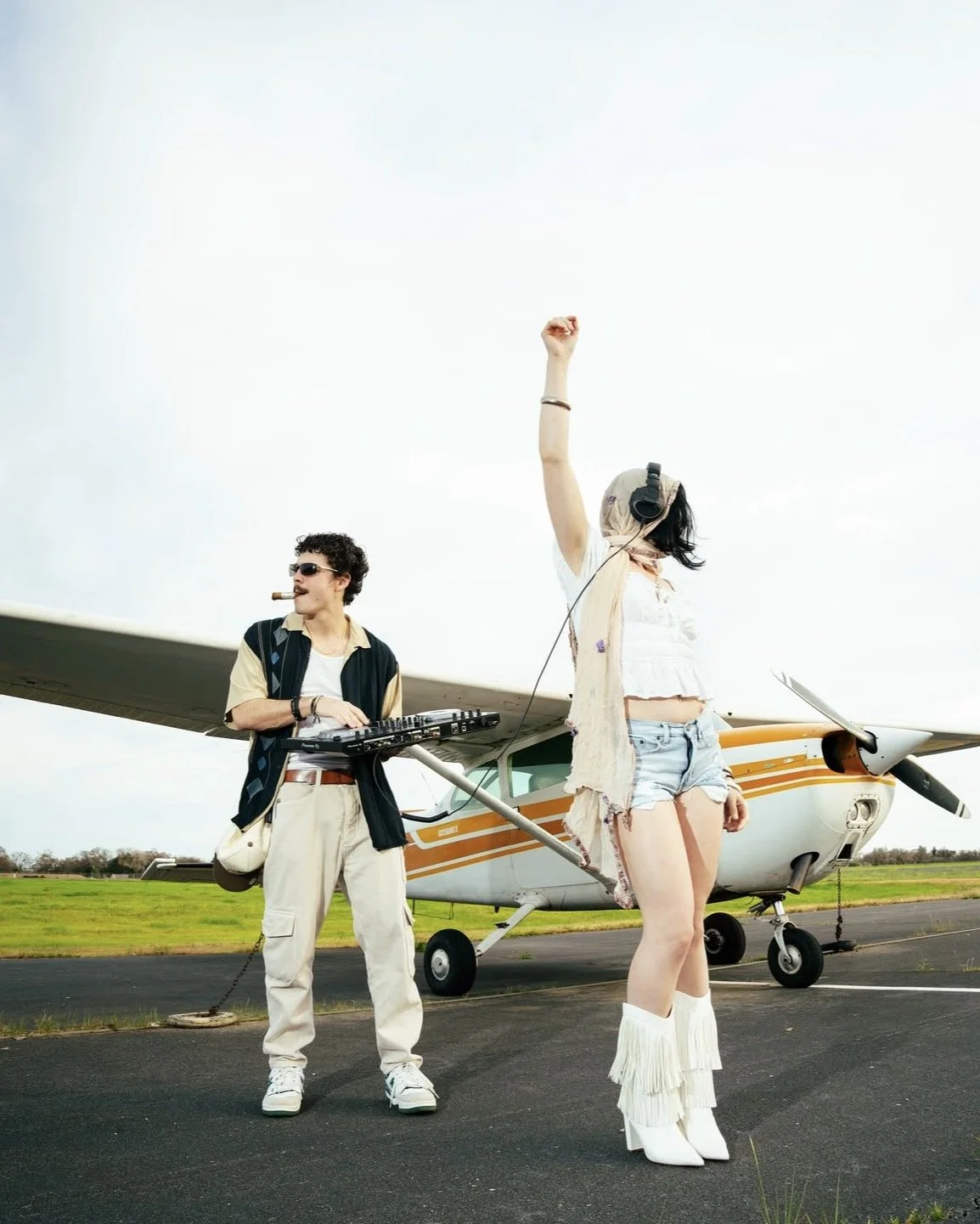“With creativity, you start doing something creative because you value it’s meaning. It has that value because of some experience you might’ve drawn inspiration from, and the extent to which you value something at is directly correlated to however much time and effort was invested in it”
- Caden Velasquez
ARTICLE NO. 01
OCTOBER 2025
Creative Resource: Tell me a little bit about yourself
Caden Velasquez: My name is Caden Velasquez and I was born in Davis, Northern California however I ended up moving all around the world because of the nature of my dad’s work. He develops and operates ports for seaside trade. When I was two, we moved to Nigeria, Ecuador, Long Beach, and other parts of the world up until I decided to come back to Davis for college. I was at UC Davis for about three years and a quarter after deciding to graduate early so I could pursue my event brand full time. As a student at Davis, my first year had been impacted by COVID-19. It was a super weird part of my life because there was the social distancing rules but then also this emergence of artists across all disciplines who wanted to share their work; whether it was art, music, sculpture, or photography. People just wanted to share what they were doing and get in front of other people and socialize.
CR: How did you involve yourself in event organization in Davis?
CV: There was this backyard DIY scene that started happening, and I got involved with promoting them and eventually I was curating and organizing these events myself. It just snowballed into producing our own events and then now we do everything from corporate media and video shoots to concert media. We’ve worked with hotels and real estate agencies but still try to keep that sort of creative side to some of the events we organize, whether we’re the sole promoter or we co-promote with other organizations. It’s pretty much just a broad and eclectic group of things that we do today but everything we do stems from a desire to support disrupting and emerging artists. We really want to work with people who are shaking things up in their respective areas and just being ambitious.
CR: You founded the Davis Rave Collective, also known as the DRC, around three-and-a-half years ago. How did it feel to have such a positive response to something that was connected to a community you were a part of for so long?
CV: It honestly feels amazing since this project had been a long time coming. I’ve been DJing for about eight years now and DRC has been around for half that time, so I think that all the big names we work with and the huge events we have going on right now have just been fostering for so long. It feels like something clicked. DRC is becoming this brand that is respected and the foundation of it is just this authentic, organic love that people have for art and creativity. The work we do connects to a lot of different people because of their desire to latch onto this idea that you can just go out there and do the creative things that you want to do. The barriers are there, but putting in the work and time lets you overcome them. DRC serves as inspiration that those obstacles come down after hard work. For example, I just got this email from a guy who wants to DJ with us, and he was telling me that one of the event series that we’ve been putting on was a concert he had gone to when he was a freshman in college, years ago. Opening those kinds of emails are overwhelming of course, but more than anything, the inspiration we’ve been able to cultivate for people is so fulfilling to me.
CR: You had the opportunity to speak on TedX about your journey with DRC. How did it feel to be speaking on a very well known platform about something you had worked so hard to realize?
CV: It was absolutely unreal. When I got the email that I had been accepted, I was just in shock. You get these little wins on creative projects that everyone is experiencing and then there’s those times where it feels like nothing is working. This win made all the tiny bumps and setbacks worth it and the Ted Talk was super fun because I had the opportunity to share the backstory of DRC and where I got my inspiration to found this collective. It was definitely one of the first times I had been able to share the story, making it all the more important to me to be able to have that platform to talk about something I am so passionate about and that has inspired so many people.
CR: Having had that experience of giving the Ted Talk, did you feel as though it helped you later on in your career?
CV: Absolutely. After the talk, it felt like I had some more legitimacy to my name. I had that backing from the presentation and then things just kept snowballing into bigger things for me; I was reached out to by the San Francisco Entertainment Commission and was asked to speak on a panel for them about immersive experience and the evolution of entertainment. This spiraled into me moderating a panel with the president of Empire Dance; basically being able to work with all these big names that I looked up to for a while now has been so empowering and motivating just having the opportunity to speak with people who are in charge of big things that could help grow DRC in the future. More than anything, it just shows that with enough time and effort, brands can grow to be on a field with the big players in entertainment.
CR: Is there anything that has stuck with you that you’ve been told or learned over the time spent working with bigger names?
CV: I think that, with creativity, you start doing something creative because you value it’s meaning. It has that value because of some experience you might’ve drawn inspiration from, and the extent to which you value something at is directly correlated to however much time and effort was invested in it. Whether or not that is everyone’s same metric for achievements, the truth of it is that you’ll only value something as much as you wanted it at some point.
CR: How have you seen this personal philosophy shining through in your professional career?
CV: Honestly, I look around and the things that I have now, the people I’ve met, and the opportunities I’ve had are all things that I wished that I’d be able to have at some point. Having the perspective of understanding that wanting things to be a part of your life is the best way to help them become reality grounded me a lot.
CR: Media is changing. We're young, and with every generation (as it has been with music over the years) the newer art is questioned. How has it felt being able to support people who had these hard moments and you’ve been able to show the value behind their art?
CV: Being able to support other new artists has felt like a responsibility given to me by other people who supported me. When I was starting out, I was given these amazing chances to prove myself from people who saw value in what I was doing. If you’re in a position where you don’t have much to offer but you can involve yourself creatively, there will be people who want to support you no matter what just for the sake of seeing themselves in the work you do. You might feel inexperienced or as though you don’t really know how things work too much. That could be true for a lot of cases; it would be irresponsible for me to say that I have a full understanding of the entertainment space because one, its always changing, and two, its been around for so long that it’s just a vast space of music and creativity. It’s so deep and the people who are disrupting the scene and changing it up that there really is room for anyone and anything new. Pursue things however you want to pursue them because thats how you can make a scene out of everything you do.
CR: How do you think being unafraid to do things has helped club culture and creative communities thrive?
CV: The entertainment community is the way it is right now because someone thought it would end up like this. Years ago, someone was just doing things the way they wanted to, and they were specific about that. I’m a creative and have respect for my craft because I know how I want to do things; I’m going to do it my way. People get successful that way and now, people see this sort of confidence and want to replicate it in their own lives. It’s not necessarily something that can be replicated, but to any young creative, what you should be replicating in your own life is ambition and refusal to abide by any and all pre-existing standards.
CR: With changes in club culture, some communities have been thriving while others haven’t. When you go to festivals and other shows, is there anything that stays with you that you want to implement or avoid in your own events?
CV: There’s so many buzzwords right now in the conversations about club culture with people on their phones and how people are drinking less. At the end of the day, people just want to feel like they’re a part of something and that’s just the direction that the entertainment space is going towards. People don’t go to festivals or concerts to see an artist perform, they go because they want to have a grasp on the event. This all comes from a desire to be a vital part of a community; they want to feel as though the space would be different if they weren’t there.
CR: How do you think events could improve the sense of community they offer to an audience?
CV: All the successful events, whether its a grassroots projects or a festival, give attendees ways to contribute and leave their mark. A fun project I can use as an example is this thing called Open Walls. It’s this initiative that was started by Tom Neill and basically it’s this mobile art gallery made up of four-by-eight wooden frames and people can pick up a paintbrush and just paint on these canvases. In that moment where the brush touches the wood, they become contributors. They become a part of the art that they experience along with so many other people. That participatory nature, alongside community and belonging, is so important to so many people.
CR: Have there been any moments when you connected so heavily with something that you were performing or that someone else was performing?
CV: As a sophomore in high school, I was really fascinated by these parties people were throwing. I was a student in Ecuador at the time at this really small school; everyone knew each other and you’d just find a flyer with an address and anyone could show up. One of them was at an outdoor basketball court that I had been practicing at for months. I had only known of the space as a basketball court but it evolved into something unrecognizable with lights and music filling the space. There’s something so powerful about being able to redefine a space; for everyone that night, that was a venue for us to be social and young. Our perception of spaces can change so easily when we find ways to nurture a social environment there. The San Fransisco Mint was the only building to survive the earthquake in 1906. We were able to set up a stage where we hosted hundreds of people and just partied there and just change how that space was defined.





